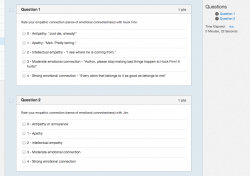
In my E314 course, I need to teach a wide array of skills, ranging from academic research to close reading, from composition to the Oxford English Dictionary. Balancing these priorities against each other, and all of the skills against the need to provide students with a basic background for some demanding books, makes for an interesting challenge. Yet after a few semesters of teaching similar courses, which provided me with plenty of opportunities for fine-tuning my organization, I was surprised to hear one student make a rather basic observation to another:



